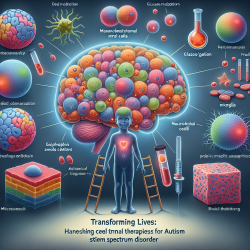Introduction
In today's fast-paced world, ultra-processed foods have become a staple in many diets, including those of children. As practitioners in the field of speech-language pathology, it is crucial to understand the impact of these foods on children's health and development. A recent umbrella review of epidemiological meta-analyses, titled "Ultra-processed food exposure and adverse health outcomes," provides valuable insights into the associations between ultra-processed foods and adverse health outcomes.
Understanding Ultra-Processed Foods
Ultra-processed foods are industrial formulations primarily composed of chemically modified substances extracted from foods, along with additives to enhance taste, texture, appearance, and durability. These foods often include packaged snacks, carbonated soft drinks, instant noodles, and ready-made meals. The Nova food classification system categorizes these foods based on their processing level.
Key Findings from the Research
The umbrella review identified 45 unique pooled analyses, revealing direct associations between ultra-processed food exposure and 32 adverse health outcomes. Notably, the research found convincing evidence linking ultra-processed foods to higher risks of cardiovascular disease-related mortality, type 2 diabetes, and prevalent anxiety outcomes.
- Cardiovascular Disease: Greater exposure to ultra-processed foods was associated with a 50% higher risk of incident cardiovascular disease-related mortality.
- Type 2 Diabetes: A dose-response relationship indicated a 12% increased risk for each additional serving of ultra-processed food.
- Mental Health: There was a 48% higher risk of prevalent anxiety outcomes associated with ultra-processed food consumption.
Implications for Practitioners
As practitioners, it is essential to integrate these findings into practice to enhance outcomes for children. Here are some actionable steps:
- Educate Families: Provide resources and guidance to families about the impact of ultra-processed foods on children's health and development.
- Promote Healthy Eating: Encourage the consumption of whole, minimally processed foods as part of a balanced diet.
- Collaborate with Schools: Work with schools to implement nutrition education programs that emphasize the importance of healthy eating habits.
- Advocate for Policy Changes: Support initiatives that aim to reduce the availability of ultra-processed foods in school environments.
Encouraging Further Research
While the current research provides a strong foundation, there is a need for further investigation into the specific mechanisms by which ultra-processed foods impact health. Practitioners are encouraged to engage in research efforts and collaborate with interdisciplinary teams to explore these areas further.
Conclusion
Understanding the impact of ultra-processed foods on children's health is critical for practitioners aiming to improve outcomes. By leveraging research findings and promoting healthier eating habits, we can contribute to the well-being of children and support their development. To read the original research paper, please follow this link: Ultra-processed food exposure and adverse health outcomes: umbrella review of epidemiological meta-analyses.










